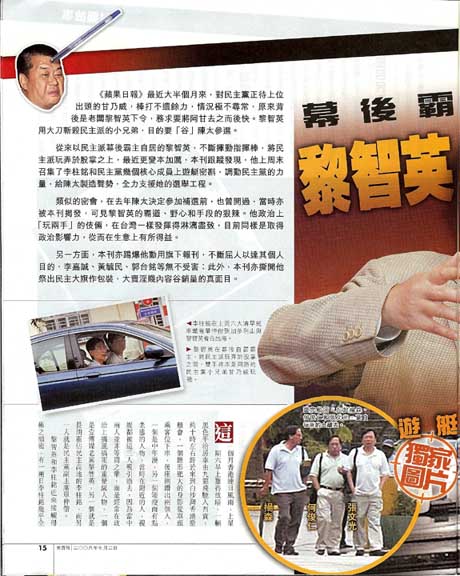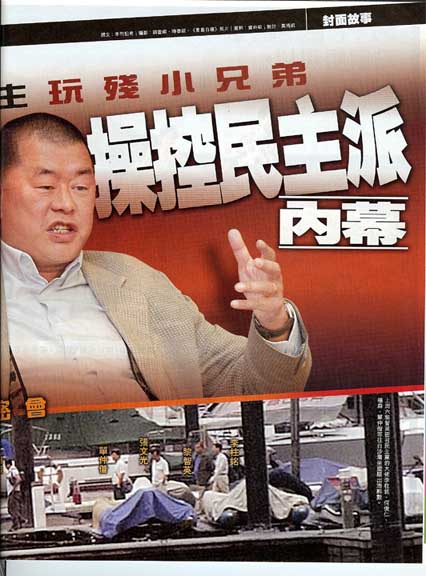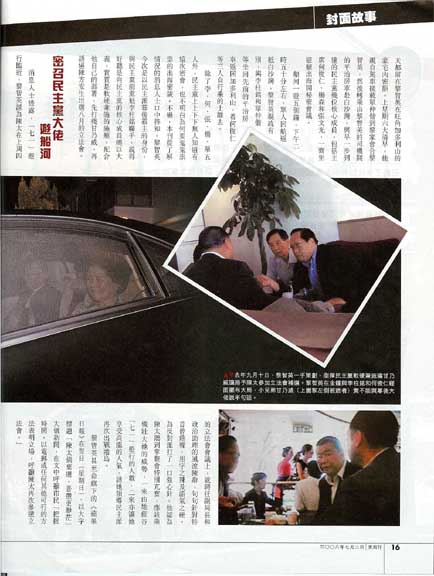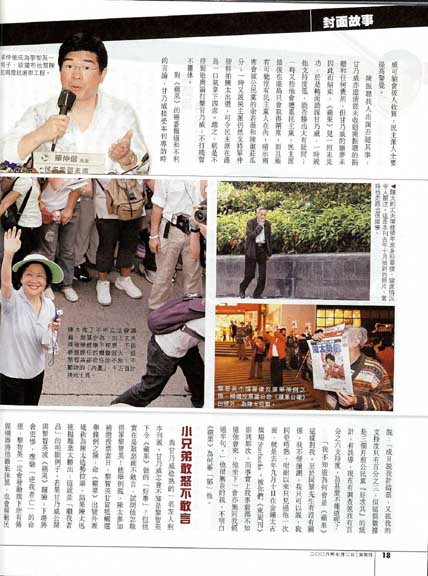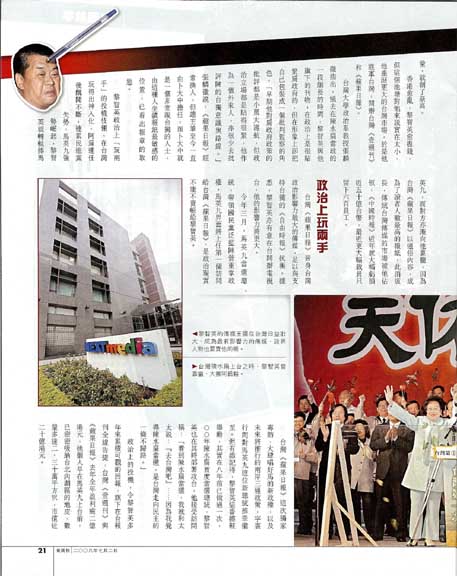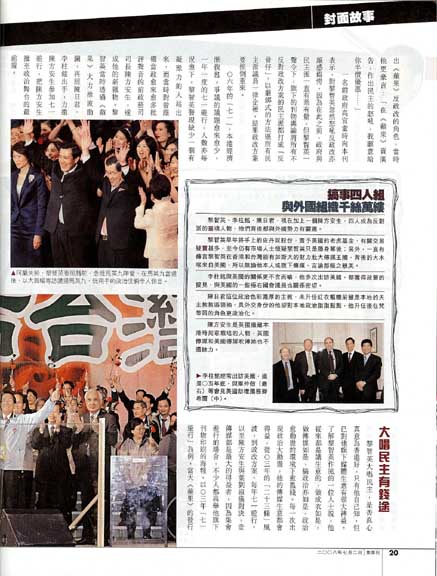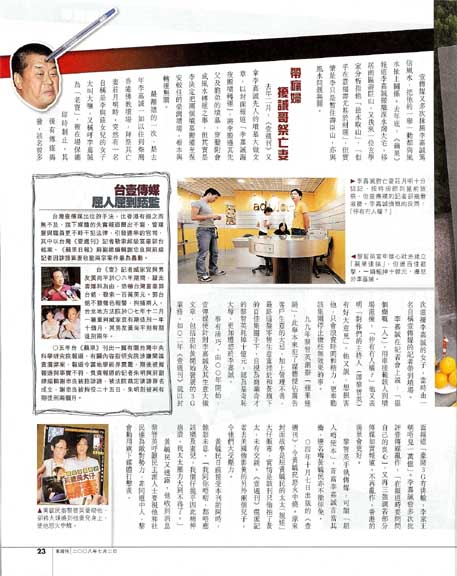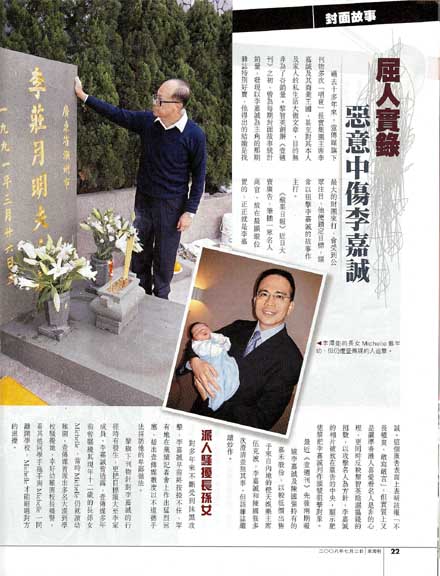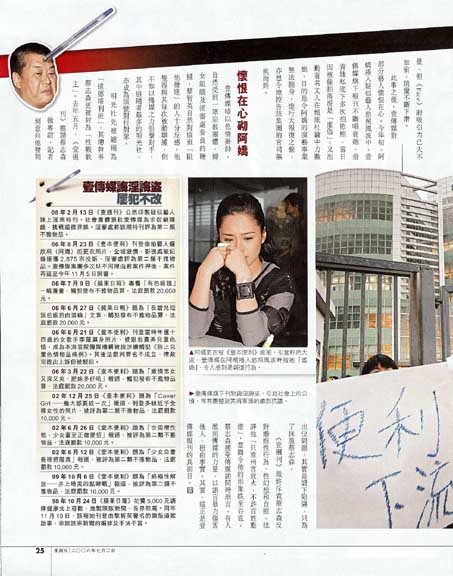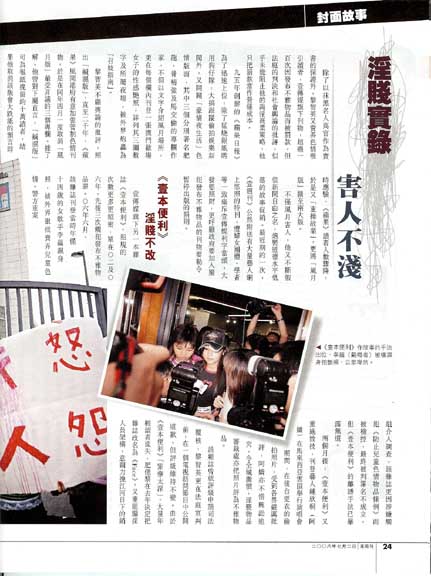This Week's Jimmy Lai Stories
(Newsweek) 'I Was Scared to Death' By George Wehrfritz. July 7-9, 2008.
Back in 1997, as Beijing regained sovereignty over Hong Kong, Jimmy Lai made everybody's short list of people who'd face trouble should Beijing decide to play tough. Lai, a vocal advocate of democracy, made millions starting trendy clothing retailer Giordano, then sold it after 1989, in the wake of China's pro-democracy demonstrations. His next venture, Next Media, is now Hong Kong's largest listed media company, and the flagship Chinese-language Apple Daily has remained unabashedly pro-democratic. Yet despite deep misgivings, Lai stayed in Hong Kong after the British departed, and 10 years on he is unabashedly bullish about the city's future. He recently discussed that decision, Hong Kong's various attributes and the state of China's media industry with NEWSWEEK's George Wehrfritz. Excerpts:
NEWSWEEK: People were concerned about media freedoms being upheld in Hong Kong after 1997. How have things gone since then?
Jimmy Lai: Beautifully. The press has been free. But a lot of the media has gone into self-censorship, either because they're so afraid or purely for economic considerations. They think that if they lean the Chinese government's way they will get [financial] benefits, or that by getting close to power they will become the voice of China. Still, there hasn't been any persecution or suppression.What has been your strategy at Next Media?
We are the opposition media here, but we've never had a journalist arrested in Hong Kong. In China, some have been detained for a few days, then released. But [the foreign media] have had this happen, too. I have not been allowed in China for more than 10 years, and our reporters have to work there on tourist visas. But we've never been intimidated, persecuted or threatened. [Beijing] has tried very hard to keep the promise of one country, two systems.Did you expect the Chinese government to act differently?
Ten years ago a lot of people told me: "They will have to arrest a few hundred people just to make sure Hong Kong doesn't revolt." And I thought that if they were to arrest just 10, maybe I'd be one of them. I was scared to death. Then the People's Liberation Army came in, and ever since we haven't seen them on the street. And nobody has been arrested.So it's all good news?
Some subtle things have been eroded, like the legacy of Western values. Free markets, small government, things like that. Under [former chief executive] Tung Chee-hwa we had some very negative years. People lost their jobs and saw their houses go into negative asset value. Since China has allowed its tourists to come here, the economy has revived but we've become more dependent on China. In the old days we struggled through hard times using our own skills and resources. Now, whenever we encounter a problem we think that China may be able to help us. The more we are dependent on China, the more Beijing will be able to maneuver or even control our lives. This is a danger, but it's very subtle.Do you know why you are blacklisted?
We've always rubbed [Beijing] the wrong way. But if we don't do that who else will? If we don't [create] a small space for different opinions, opposition opinions, there will be no competition of ideas and society will lean to one side. That would not be good for Hong Kong.Any hope you might be allowed back into China?
Not for a long time. I think we have very good leverage [over Beijing] in Taiwan. We are the biggest newspaper and magazine there, which gives us protection because Beijing cares more about Taiwan than they do Hong Kong, which is already in their pocket.When you moved into Taiwan's media market, some people saw it as a vote of no confidence against Hong Kong. You're suggesting it was an insurance policy?
That was the intention. I couldn't go to the United States and say: "Can you protect me?" Nobody would care. But I knew Beijing was thinking very much about Taiwan, and that they don't want bad press there. So we built the Taiwan business as leverage. If they do anything to us, our Taiwanese readers will know what happened. And Beijing knows that [should they move against us] we will do everything we can to make them pay on Taiwan.What about China's own media? Is it gaining more freedom as China rises?
The media is actually under greater control than before. [Chinese President] Hu Jintao has really squeezed them a lot since taking power. If they can find better ways to control the Internet, better ways to control the media, they will do so. Eventually, what is going to overcome Chinese control is technology. But they are not going to launch their own initiatives to open the media [until] Chinese politics begins to liberalize.Some experts argue that China does not intend to Westernize or liberalize, but only to modernize. Do you think people in China understand what democracy is and want it?
Not at this moment. But anyone who would differentiate between Westernization and modernization is just talking rubbish. Take out the western culture and what else is modern? Nothing. The technology is Western, the trendy culture is Western, all this modernization is Westernization. China is prosperous today because it deals and interacts with the West. No, democracy isn't on normal people's radars yet. China will be open to it only when the economic cycle turns down. And when that happens, China will be in chaos.How so?
In other countries, when there is a recession, you have churches, temples, charities, NGOs, civic organizations, unions and other institutions reaching out to help each other. They are shock absorbers. In China, you don't have any of this. Organizations that are not governmental are not allowed. In China, you have two pillars: the market and the government. If the market fails, the government will be dragged down because there is nothing in the middle.That is just the opposite of what many economists here say.
There's no such thing as perpetual-motion machines, and no economy without cycles. We haven't seen the boom's flip side yet, and when we do it is going to be disastrous. As the cake becomes smaller in China, everyone will fight for it. There is no moral infrastructure. People don't care about anyone but themselves, about making money and having a better life. Then all of a sudden, this hope is dashed. People will fight in situations where, in places like Taiwan or the United States, they would extend their hands to help each other.What makes you think so?
Look at the environment. The fundamental issue is not regulation but morality. If I don't care about the people next to me, how much can I care about trees and animals in the forest, the birds in the air or the fish in the water?When do you think this crisis could occur?
I have no sense of the timeframe, but things are heating up. The craziness you see in the stock market is a sign that things may have gone too far already. China has expanded for the last 20 years. And so far everybody that predicted when it would end has been wrong. But one day they will be right. The government has tried so hard to make the [2008] Olympic Games a success. They have distorted a lot of investment and a lot of infrastructure development [to achieve that], and such waste could be the fatal blow.Is Hong Kong's economy at risk from competitors like Shanghai and Singapore?
No. Hong Kong still has financial integrity, professionalism, rule of law and transparency. All that will draw in the biggest financial deals. It's very natural. Before China allowed its citizens to visit, our private hospitals were almost dying. Now they're all full. You can't just walk in and get a [hospital] room because Chinese who are rich enough and do not trust their own hospitals are there. If you believe Hong Kong's rule of law, free-flowing information, professionalism and integrity are part of our comparative advantage, you can assume that the more we integrate with China the more our advantages will be manifested in other areas.Such as?
Insurance. Legal matters. Anything where you have to trust the system, obey the law and respect contracts¡Xas they don't do in China¡Xwill gravitate here.
At the end of the day, Hong Kong's competitive advantage is the legacy of a Westernized, cosmopolitan city that we inherited from the British. This Beijing understands. To keep Hong Kong prosperous, you have to preserve its integrity as an international city.
Related Link: A Chinaman in a Giordano East Wind
Meanwhile, the July 2, 2008 issue of Eastweek magazine devoted a total of 12 pages to a front page story about the same Jimmy Lai. This is a sharp contrast to the Newsweek interview. In this Eastweek feature, Jimmy Lai is accused of the following sins among many others):
While certain NGO journalist organizations may decry this 'hit' article as an assault on the freedom of press in Hong Kong, Jimmy Lai is more likely to appreciate the free publicity. After all, it is axiomatic that there is no such thing as negative publicity -- there is only publicity! How many people get 12 pages in a Hong Kong tabloid weekly magazine? I can't remember anyone except for Edison Chen and the Wenchuan earthquake. After working hard for many years, the ESWN blogger only got four pages in the October 3, 2007 issue of EastWeek.
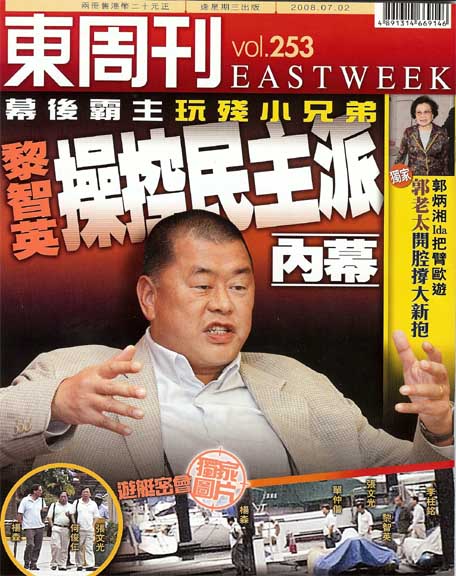
Cover Story: The Inside Story About How Jimmy Lai Is Manipulating The Democrats
